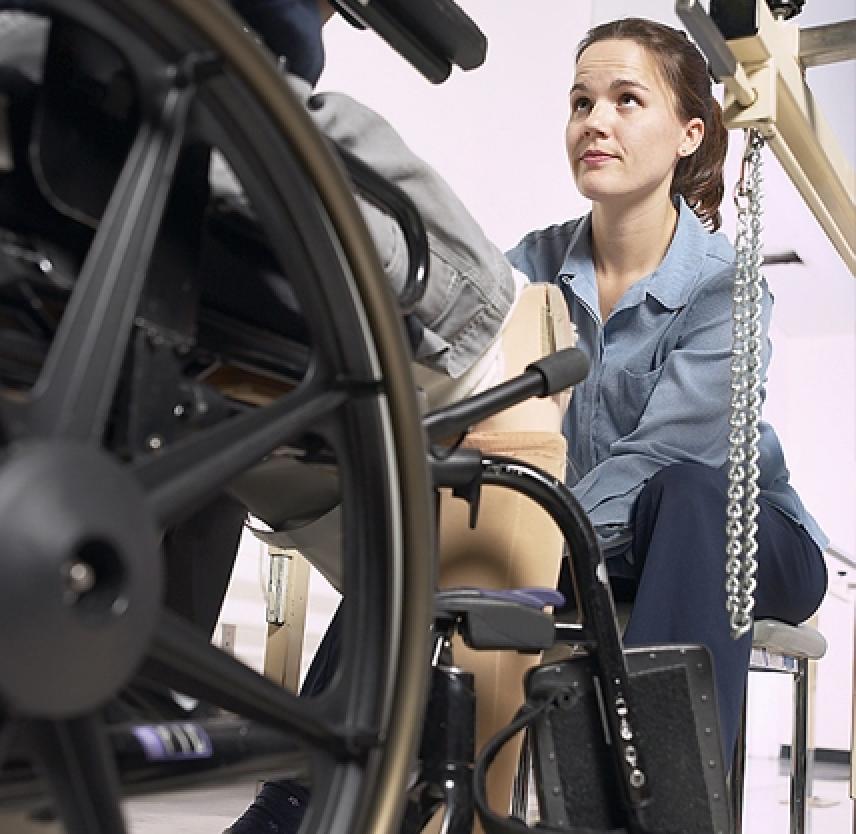
Research has found that patients who received inpatient rehabilitation after brain injury had better outcomes than patients who received only acute care. Outcomes were measured in the areas of functional status, daily care requirements, ability to return home and vocational status.
Elements of TBI Rehabilitation
According to Cope (1995), comprehensive TBI rehabilitation today consists of at least the following elements:
- The rehabilitation physician (also known as a physiatrist) and rehabilitation nurse have special training in diagnosing and treating people with disabilities. Their goal is to help the patient function as independently as possible.
- The prevention of secondary deterioration is important. Evidence clearly confirms that specific interventions can prevent deterioration and complications. These interventions may not reliably occur in non-rehabilitation environments.
- Rehabilitation builds upon natural recovery processes. Rehabilitation interventions are incremental and work toward functional gains. The challenges of mobility, self-care and communication can be overwhelming for the patient. This may result in a hopeless “giving-up” response by the patient. Over time and with comprehensive rehabilitation, progress can occur.
- An optimal environment for neurological recovery is provided by rehabilitation settings.
- Various compensatory techniques are provided and taught to promote recovery and help with the tasks of daily living.
- Adaptive and specialized equipment, such as wheelchairs or orthoses, is available in this setting.
- Environmental modifications are available. These include architectural and transportation interventions. Even more important may be interventions in the patient’s social milieu, which include modifications at home, at work and in the community.
In the Report of the Panel for Consensus Development Conference on Rehabilitation of Persons with Traumatic Brain Injury dated October 1998, Diane Murphy, a survivor since 1990, made these comments below concerning the need for rehabilitation services and difficulties associated with under diagnosis of TBI:
“I am six years post-accident. However, getting here was not an easy task. Taking the advice of very educated doctors, my husband brought my broken body home after being in the hospital in critical condition for two weeks. My family did not worry about my brain injury, at least not out loud. They tended to the visible injuries, thanking God every day that my daughter and I had survived the accident. Who ever heard of a brain injury that doesn’t kill the person or put them in a lifelong coma? Right? Becoming better wasn’t nearly as hard as finding the right place to get better. I would really like to see the health community and general population informed about all the problems associated with a mild brain injury. I am hoping that the next person with a brain injury gets directed to immediate care, not a band aid excuse of ‘Don’t worry — it will all work itself out.’”
Unfortunately, the story described does occur. Inpatient or outpatient rehabilitation can begin to address the brain injury issues that cause so much frustration and confusion.
This fact sheet is part of the TBI Toolkit produced by the Washington State Department of Social & Health Services, Aging & Disability Services Administration. Reprinted from: ‘Skill Pak for Hospital Staff to Help Families Understand Brain Injury’, TBI Project A.C.C.E.S.S., North Carolina Department of Health & Human Services. References: Report of the Panel for Consensus Development Conference on the Rehabilitation of Persons with TBI, October 26-28, 1998.
Cope, Nathan, ‘‘The Effectiveness of Traumatic Brain Injury Rehabilitation, a Review’’ ‘Brain Injury’, Volume 9, No. 7 1995, pages 649-670. Additional copies of the TBI Toolkit can be downloaded at http://www.aasa.dshs.wa.gov/Library/tbitoolkitpro.pdf.

Comments (2)
Please remember, we are not able to give medical or legal advice. If you have medical concerns, please consult your doctor. All posted comments are the views and opinions of the poster only.
Anonymous replied on Permalink
Anonymous replied on Permalink